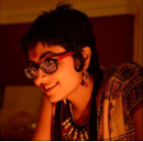Love After Babel: Into the heart of the un-translatable

His poems are lean in physique, yet they possess astonishing depth in weaving vivid, imagistic language and voices from the margins together. The results are exquisite literary artefacts.
The biblical psalm referring to the “divine” conspiracy of shattering of “All one language” to many so people lose their ability to understand each other is more than apt as a prologue to the collection that deals with the woes of the (un)translatability of language. While a persistent theme and probably the strongest element that captured my reader’s heart, the crises and crevasses existing in the idea of translation, is not the only thrust of most of the poems, they move far beyond. Delving deep into the rhetorical conflicts—the battlefield that every work of translation (read. communication) raises, it attempts to put its fingers on other crucial and unignorable pain points of racial injustice, wounds of unfair casteism. They find expressions of each other; in the empathetic hands of the poet their pains become one, bruises converge to form lines that resonate with rebellious defiance.
“The vernacular was never its surrogate womb
This poem was not conceived with translation in mind
Will never let it be adopted
Or exported to worldwide markets
Nor will the metaphors mellow down
To make it amenable to translation
Into an alien tongue.”
-The Muse in the Marketplace (P- 5)
Many a times, art that speaks to rebel or attempts to make statements about certain ideologies, claims a stance (not that there is anything wrong in that), does so at the cost of compromising their artistic finesse. The “what” overpowers the “how” where lies the heart of poetic form. Time and again, Chandramohan’s verse ventures into complex socio-political issues but what sets them apart from the plethora of “Activist Poems” is their unwavering commitment to aesthetic splendor, a poignant awareness of the nature’s beauty even in the middle of war—
“A translated poem is always in transit
Like a flock of birds in fight
Scripting a camaraderie in a cloudless sky.”
(untitled no 6, P-11)
Move the Margins: Conversation with Chandramohan Sathyanathan

Chandramohan S is one of India’s brightest emerging poetic voices. Identifying himself as a Dalit poet and literary critic based in Trivandrum, his accolades include a shortlist for Srinivas Rayaprol Poetry Prize 2016. He also was awarded a fellowship at the International Writing Program (IWP-2018) at the University of Iowa.
His collection of poems “Letters to Namdeo Dhasal” was published in the year 2016.
Even though I had a list of questionnaires ready for him, on the day of the event, they turned out to be loose anchors as our discussion paced freely from race politics to the twilight waters of literature and craft.
Listen to this wonderful man in this charged conversation with The Antonym:


























0 Comments